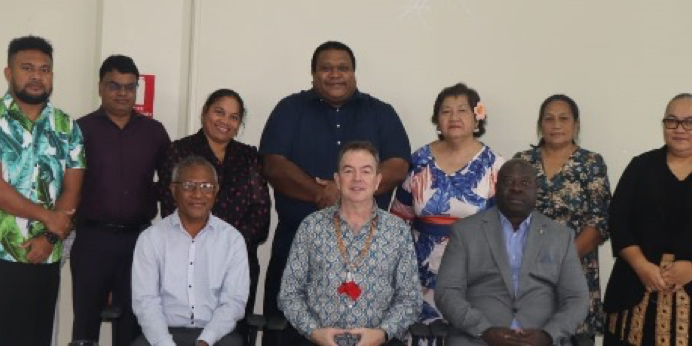The Minister of Education and Human Resources Development (MEHRD), Hon. Tozen Leokana, has commended the leadership of the Commonwealth of Learning (COL) President, Professor Peter Scott, for his dedication to strengthening education across the Commonwealth.
Hon. Leokana expressed his appreciation during the closing reception of the two-day Regional Consultative workshop on Developing a Commonwealth Credit Transfer Framework, held on Tuesday, 25th March, at the Mendana Hotel.
“I extend my deep appreciation for your visionary leadership and unwavering commitment to advancing education across the Commonwealth. “Your leadership is truly inspiring,” he stated.
The Minister also acknowledged the Vice Chancellor of the Solomon Islands National University (SINU), Professor Transform Aqorau, for hosting the workshop at the Faculty of Agriculture, Fisheries, and Forestry conference facility at Kukum Campus.
In his welcome remarks, Professor Aqorau emphasized the need to develop a policy to facilitate the formulation of a Credit Transfer Framework and Micro-Credentials. The Minister also commended the SINU Vice Chancellor for his leadership in steering SINU towards a new direction aimed at enhancing the quality of tertiary education in the Solomon Islands.

Hon. Leokana highlighted that the two-day workshop provided a valuable platform for key national and institutional post-secondary education stakeholders to engage in discussions and contribute to a harmonized Pacific strategy for the credit transfer framework and micro-credential recognition.
During a meeting of Commonwealth of Learning (COL) Focal Points from the Pacific Island Countries held on Wednesday 26 March, Permanent Secretary Dr. Franco Rodie called for action to rethink, reimagine, and re-strategise approaches to addressing the pressing challenges facing education in the region. “Our education system is at a crossroads,” Dr. Rodie stated.
He reminded his fellow COL Focal Points in the Pacific that traditional methods of delivering education are being tested and, in many cases, are no longer sufficient. To meet the aspirations of learners and communities, he emphasised the need to embrace new solutions, adopt fresh mindsets, and be open to innovative approaches.
“We should not only be content with what we have achieved but, most importantly, seek ways to improve our education system—making it more efficient and effective to achieve the outcomes we have set,” he added.

Dr. Rodie further emphasised the unique role of COL focal points in bridging the gap between policy and practice, urging them to lead efforts in identifying innovative approaches that align with regional realities. This includes harnessing technology, strengthening open and distance learning, and ensuring education remains inclusive, equitable, and relevant.
The workshop was organised by the Commonwealth of Learning, based in Vancouver, Canada, in collaboration with SINU and MEHRD under the theme “Commonwealth Credit Transfer Framework: Micro-Credentials in a Digital Age.” The event brought together participants from Papua New Guinea, Australia, Fiji, Kiribati, Nauru, New Zealand, Samoa, Tonga, Tuvalu, and the Solomon Islands.
- MEHRD









